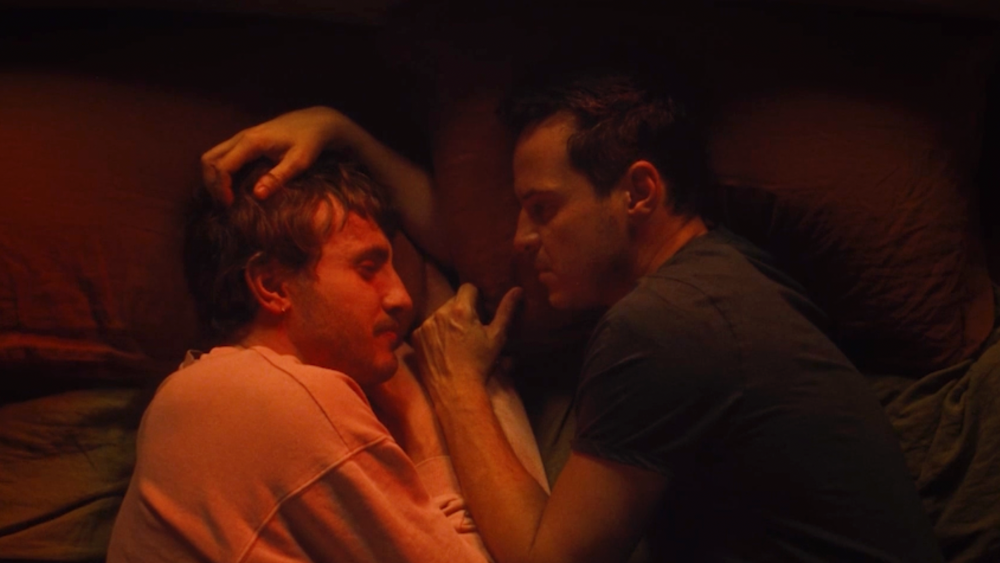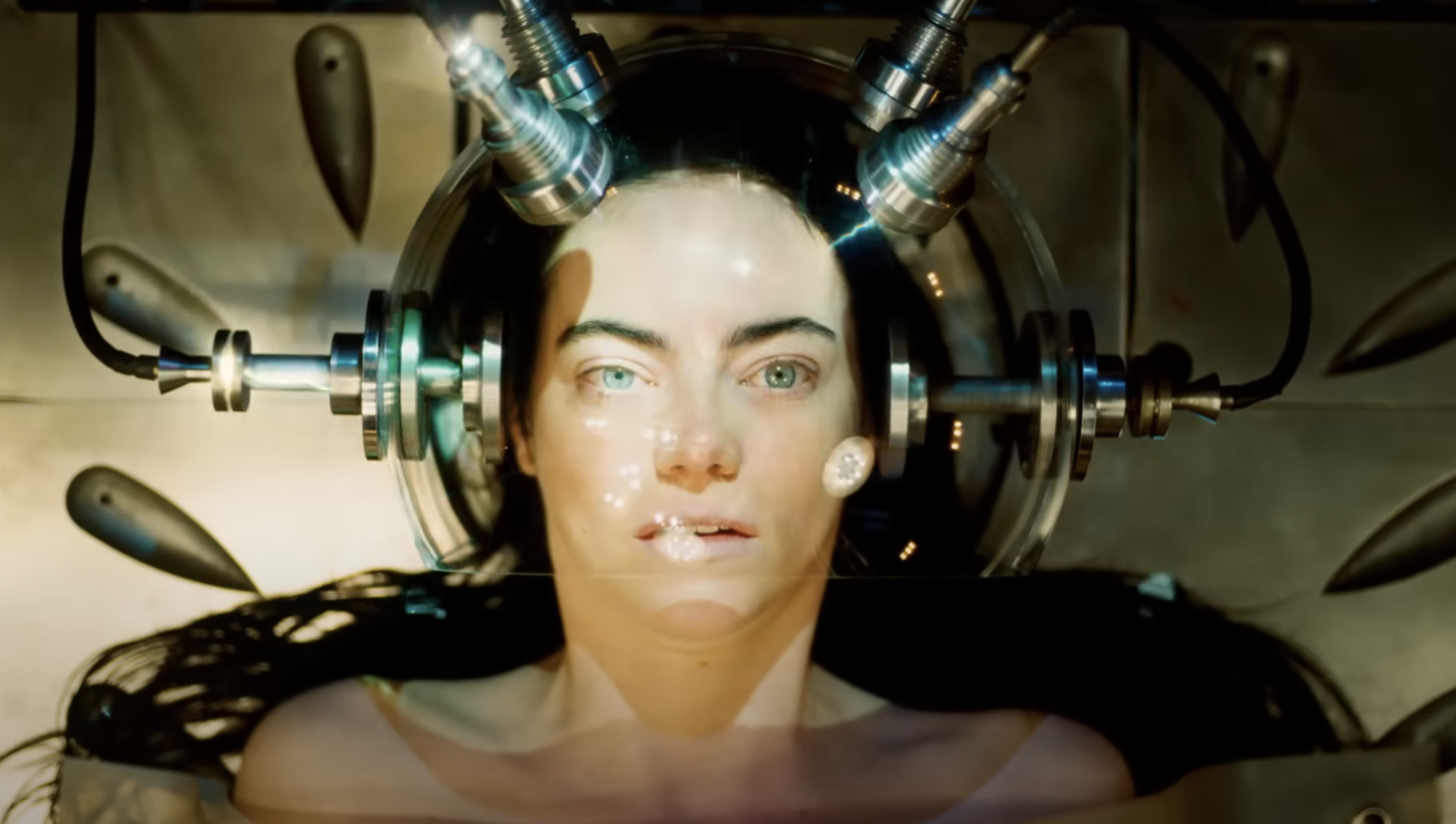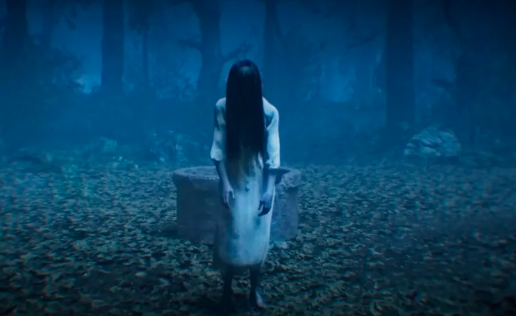Books & Culture
MEDIA FRANKENSTEIN: Surveillance

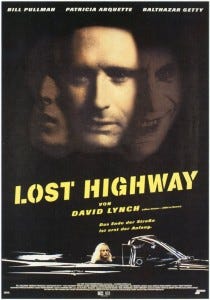
THE HEAD: Lost Highway dir. David Lynch (1997)
There’s a scene in David Lynch’s 1997 neo-noir head-trip Lost Highway thathas Fred (Bill Pullman) taking down shots at a bar in the midst of a party when a short man with black hair and insanely staring eyes, his face painted with Kabuki makeup (played by real-life acquitted murderer Robert Blake and credited as “Mystery Man”) approaches him through the crowd. The sound cuts outs but for their voices.
Blake: We’ve met before, haven’t we?
Pullman: I don’t think so. Where was it you think we met?
Blake: At your house, don’t you remember?
Pullman: No, no I don’t. You’re sure?
Blake: Of course. As a matter of fact, I’m there right now.
To prove it Blake proceeds to take out his cellphone, encouraging Pullman to call him. When Pullman does, Blake’s voice picks up on the other end before emitting a surround-sound cackle that comes from both the Blake at the party and the Blake at Pullman’s house, jolting the audience from its trance of unease into terror. That the best scene in Lost Highway is also one that speaks forcefully to its major theme of surveillance is convenient for my purposes here. Lost Highway is an underrated movie by Lynch, I’ve come to think, yet just like all of Lynch’s movies it traffics in identity switches, inexplicably malevolent supernatural figures, female sexuality with teeth and the transcendental meditation-inflected pacing which is the director’s trademark. The film takes its anchor in two intersecting yet also directly abutting storylines; one of them involves the tortured marriage between Fred, a jazz saxophonist (played by Pullman) and his cuckolding wife, Renee (Patricia Arquette), while the other follows the embroilments among a car mechanic (Balthazar Getty), a rage-aholic mobster (Robbert Loggia) and the mobster’s moll (also played by Patricia Arquette) who may or may not be Renee’s infernal double. The story begins with Fred and Renee living in their modern and dimly lit LA home, where they start to receive a series of sinister videotapes that show, by way of fuzzy tracking shots, the front of their house, their living room, their sleeping bodies. The aura of someone scrutinizing Fred and Renee’s every waking breath Lynch underscores with his wandering and casually invasive camerawork, often with a blood-red curtain lurking just beyond the shot. Angelo Baldamenti, Lynch’s soundtrack man, lays down a haunting, electronic overlay, alongside guest appearances from Nine Inch Nails, Marilyn Manson and David Bowie. The tone of the film is a testament to Lynch’s playful and ever-evolving relationship to genre, specifically his love of pulp; you’d be hard-pressed to find a pulpier figure than Robert Blake’s incessantly questioning angel of destruction or a pulpier circumstance than the decaying marriage of a nightclub saxophonist to a smoky-voiced femme fatale.
Lynch’s genre bending and meta-textuality underscores the thematic concern of surveillance.
The film’s as aware of itself as a film as its characters are of the forces that watch them. A sort of schizophrenia begins the show amid the reels as the movie’s conventions part ways with themselves. As matters between Fred and Renee arrive at their culmination, there is a shift in the film that starkly divides the first movement from the second — the saxophonist, Fred (Pullman) turns into a completely different person, the mechanic (Balthazar Getty) — and gleefully logic begins to unravel as Lost Highway takes off in a second direction with lingering echoes that presage the first: Patricia Arquette, now a blonde gangster moll; the imp in Kabuki face paint from the party. As you are watching David Lynch, there are no answers by the end. The mechanic turns back into the saxophonist and as the film concludes vice-versa. But no matter how much their identities shift the two men stay, at root, the same. They are passive and prideful and, as the film builds, capable of committing or being complicit in nauseous-making acts of violence. Surveillance comes to mean far more than a man at a party or strange VHS’ but in itself an act of violence that tears one asunder from one’s truest self.
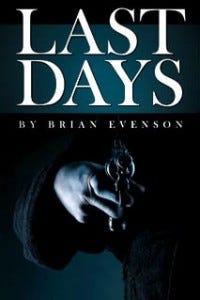
THE TORSO: Last Days by Brian Evenson (2009)
A similar upheaval of personhood takes place in Brian Evenson’s 2nd novel Last Days (also a neo-noir with pulpy splashes of Gothic horror)in which a mutilated P.I., Kline, reminiscent of Dashiell Hammett’s Continental Op from his gangland novel Red Harvest (1929), finds himself a subject of surveillance among the ranks of a cult that functions on the principle that limbless-ness equals godliness. As early as page 1, Last Days reckons with the alienating wages of surveillance: “It was only later that [Kline] realized the reason they had called him, but by then it was too late for the information to do him any good. At the time, all the two men had told him on the telephone was that they’d seen his picture in the paper, read about his infiltration and so-called heroism and how, even when faced with the man with the cleaver — or the “gentleman with the cleaver” as they chose to call him — he hadn’t flinched, hadn’t given a thing away.” That “reason,” forebodingly alluded to by Evenson in the novel’s opening sentence, becomes somewhat of an existential red herring over the course of Last Days as
Evenson embarks his anti-hero through a rat’s maze of double-crossings, metaphysical trapdoors and many, many murders.
At the outset, Kline is called upon in his infinite bad-assery to investigate the murder of the cult’s founder Aline — after losing his arm in a scuffle right before the book picks up, Kline self-cauterizes the wound on a hot-plate. And while the real reason that he was recruited continually escapes his grasp, Kline’s M.O. diverts from the mystery at hand to wanting no more than to be left alone. Herein lies Evenson’s mordantly funny nod to Red Harvest — the Continental Op, too, wants only to be left in peace — his Lynchian existentialism and his tongue-in-cheek approach to the theme of surveillance in the novel. While the justifiably paranoid “they” who are tracking Kline’s every movement in Last Days — and who find their rhyme in Blake’s Mystery Man from Lost Highway — are possessed of a set of lofty, hierarchal ideals deriving, in part, from the Bible (“And if thy right hand offend thee, cut it off, and cast it from thee: for it is profitable for thee that one of thy members should perish, and not that thy whole body should be cast into hell”) Kline fights toward a goal no loftier than the basic human need for restful solitude. As this prospect is withheld from him with escalating sadism, a split occurs in both the character and the plot of the novel similar to that which takes place in Lost Highway between the saxophonist and the auto-mechanic, between causality and chaos. Kline, no more passive than Pullman or Getty in the hostile world of Lynch’s film, is driven to commit an operatic act of violence of which, when Last Days begins, the reader may not have imagined him capable. “If I use only one clip,” Kline ponders in the pages leading up to the novel’s grisly climax, “…maybe I can still come out of this human.” But Kline speaks truer than he knows. What’s at stake in the novel, finally, is neither Kline’s desire to be left in peace nor the riddle of what happened to Aline but Kline’s personhood, as it’s been all along. Kline’s loss of self-sovereignty to the surveillance and manipulation of the cult drives drives him to reclaim it by unspeakable means. At the end of the novel he’s more than he was: an instrument of “holy wrath.”
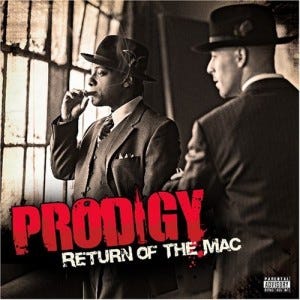
THE LEGS: Prodigy’s Return of the Mac (2007)
Prodigy (formerly of Mobb Deep) composes an elegy to surveillance and paranoia in the rapper’s 2nd solo albumReturn of the Mac. Loosely grouped in with the brief horror-core craze of the early 90’s alongside Gravediggaz and Flatlinerz, Prodigy pick-axes into incisive psychological ground on this East-Coast-pride themed record where the beats are damn dirty, the lyrics relentless. On one of the album’s singles, “Mac 10 Handle,” Prodigy raps: “I sit alone in my dirty ass room starin’ at candles/ High on drugs — all alone wit my hand on the Mac 10 Handle/ Schemin’ on you niggas…
By myself in my four-corner room watchin’ Hard Boiled, I feel like I’m crazy… They got eyes in the sky, we under surveillance… Gotta watch what I say, they tappin’ my cell phone
/ They wanna sneak and peek inside my home/ I’m paranoid and it’s not the weed/ In my rearview mirror, each car they follow me…” As though the reference to John Woo’s Chinese shoot-em-up Hard Boiled (1992) weren’t testament enough, Prodigy and so much of horror-core hip-hop wallows unabashedly in pulp noir and various other forms of genre experimentation. One need look no further than the schlock-celebratory video for “Mac 10 Handle,” in which a shirtless and prodigiously tattooed Prodigy, well, sits “all alone in [his] four-corner room” surrounded by occult candles and the grim debris of prolonged intoxication, washing his corn-rowed head in his hands in between bouts of loading his clip and stabbing the cushions of a couch that gushes real blood. The video even contains a cameo appearance from cinematic boogeyman Michael Myers alongside images of a snake burrowing through the ocular cavities of a human skull and a Halloween-mask Satan enticing Prodigy to “put some work in.” And this he proceeds to do, cruising his car around Queens while scanning the street for real or imagined enemies, his face in a rictus of kinetic alertness that recalls Kline’s take-no-prisoners massacre at the end of Last Days or Pullman/Getty’s bloody dash for redemption in Lost Highway. And yet the paranoia and surveillance that pervades the song — and the record as a whole — has roots in the real world as well, specifically the East Coast-West Coast criminal one-upmanship of the mid-to-late 90’s which tragically took the lives of both Tupac Shakur and Biggie Smalls, and Prodigy’s own rocky Queens upbringing. By juxtaposing the effects of real with imagined violence on Return of the Mac Prodigy seems to be suggesting a split in his own fictionalized consciousness similar to that which Pullman/Getty and Kline experience in Lost Highway and Last Days. He’s aggressive one moment and tender the next; he’s cocksure, forceful, scared as hell. Over the course of the album, surveillance and paranoia have the sum effect of worrying away the rapper’s personhood, reducing him to something blank to which his most immediate circumstances affix themselves — in “Mac 10 Handle,” an unsavory diet of spliffs, murder films and jugs of Henny. As Prodigy raps on the album’s other single, “Return of the Mac, aka New York Shit,” “Heard ya workin’ with the D’s, you a New York snitch/ I’m tryn’a make a hundred mil’, that’s New York rich/ Back an’ forth to Philly with these New York bricks… I got eleven Mac 11’s, thirty-eight .38’s/ Nine 9’s, ten Mac-10’s, this shit don’t end…” The compulsively violent and utterly isolated ceaselessness of Prodigy’s condition on many of the songs on Return of the Mac is the scariest thing about it. In many ways, Prodigy seems to be attempting to extract the gangster lifestyle from its diamond-encrusted cultural context; it’s as much as process of de-glamorization as it is one of de-familiarization — “Too much of that gangsta music,” raps Prodigy in “Mac 10 Handle, “nah this reality rap/ I really go through with it…”
And so while the characters from <em>Lost Highway </em>and <em>Last Days</em> come under surveillance by unknowable forces, the forces compromising Prodigy are utterly banal — his rivals, his lust for cash-money, himself.
The prison of the self at last — say, a “four-corner room” where we all sit “starin’ at candles, high on drugs” — amounts to surveillance at its furthest (or shortest, as it were) conceivable tether. The one pair of eyes you can never escape is looking at this screen right now.
Alternative Cuts:
Reflections in a Golden Eye by Carson McCullers (1967); Blood Simple dir. Joel & Ethan Coen (1984); The Wilding by Benjamin Percy (2011)
Jealousy by Allain Robbe-Grillet (1957); Caché dir. Michael Heneke (2005); Marcel Duchamp’s Étante Donnés (1946–1966)
The Untouchable by John Banville (1998); Tinker, Tailor, Soldier, Spy dir. Tomas Alfredson (2011); The Pogues’ If I Should Fall From the Grace of God (1988)
The Lives of Others dir. Florian Henckel von Donnersmarck (2006); Pulp’s This is Hardcore (1998); Thomas Mann’s Death in Venice (1912)
Previous MEDIA FRANKENSTEINS:
In Two Weeks: College






